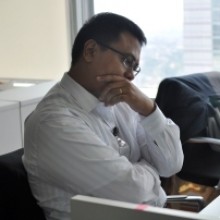Dalam artikelnya yang dipublikasikan di Majalah ISE (Industrial and Systems Engineering at Work), Rona Howenstine secara tidak langsung membuka “luka lama” atas ketidakjelasan keilmuan teknik industri di kacamata orang awam jika dibandingkan dengan bidang ilmu teknik lainnya. Kenapa saya tuliskan “jika dibandingkan” karena sebenarnya jika kita memandang teknik industri terlepas dari bidang ilmu teknik lainnya maka sebenarnya posisinya memang berbeda namun tidak aneh. Saya bahkan pernah membandingkan teknik industri dengan arsitektur misalnya, dan tidak ada yang melihat bahwa Arsitektur aneh bukan.
Namun bukan luka lama yang saya mau buka kembali, namun saya ingin menceritakan kembali bahwa kurikulum, pola pendidikan dan tantangan yang dihadapi oleh mahasiswa teknik industri dalam perkuliahannya ternyata telah berhasil membentuk berbagai softskills penting yang menjadi ciri unik dari perekayasa industri, mereka adalah (saya kutip langsung dari artikelnya):
Consider how IEs approach and accomplish their work, and therein lies the secret sauce to their versatility. Here are some examples of what makes IEs unique:
- How they think: IEs consider the entire system. They examine processes from end to end and can immediately identify waste and variation.
- How they influence: IEs enable and convince individuals and teams to make positive change with every engagement, which requires great communication skills, the ability to facilitate, high energy and, in challenging cases, a large investment of emotional capital.
- How they approach situations: IEs can affect improvement in incremental or monumental undertakings. Their approach is always scalable, and they choose tools that are fit for a purpose. IEs will take the time to teach and explain in order to bring a team along and to ensure their fingerprints are on the final solution. Proliferation of knowledge, facilitating through challenging situations and dispelling fear are an IE’s specialty.
- How they plan: IEs have all taken a project management course and adapted their knowledge and style to the situation. They are well-versed in the quote attributed to both Benjamin Franklin and Winston Churchill, “If you fail to plan, then plan to fail.”
- How they measure: IEs need to know what is being measured, why, what success looks like and if the team is winning. They are hooked on operational definitions and scorekeepers, sometimes to a fault. IEs understand that what gets measured gets managed and that inappropriate measures drive bad behavior.
- How they analyze: IEs begin with the notion that there has to be a story that can be told from the data (if there is data). Then, they dig for the information and have been known to torture data sets until they scream for mercy. An IE’s best friend is usually Microsoft Excel, Minitab or any program that allows them to codify, stratify, classify, evaluate and visually display their data in a meaningful manner that is easily explainable. IEs enjoy interpreting and simplifying information and never suffer from analysis paralysis. Oh, and Visio might be their second best friend.
- How they solve problems: IEs seek to find and prove root cause and to implement a permanent fix, without exception. It is never enough to fix a process for the short term, and the worst thing for an IE is to revisit the same issue a second time or, gasp, a third time.
- How they make decisions: IEs have clear and concise methods they use for decision-making. It doesn’t matter whether they are buying a house, choosing a daycare, or transforming an entire operation, IEs know what factors matter in each situation. They can always calculate a weighted average of all the factors so their team (or family) can narrow the field and make the best choice in a timely manner.
- How they consider risk: IEs actually consider risk and quantify it without fearing it, both at work and home. Have you ever alerted someone to a risk that was very likely to happen? Then when they ignored you and it actually occurred, you didn’t even say “I told you so.” An IE would take this as an opportunity to help them resolve the issue by assembling a full FMEA (failure mode and effects analysis).
Ke-9 keunikan ini membuat Perekayasa Industri menjadi sangat adaptif dimanapun mereka bekerja sehingga dianggap sebagai bunglonnya bidang teknik seperti judul dalam artikelnya. Saya pernah memberikan judul spesialisasi unik Teknik Industri sebagai Spesialis Generalis, yaitu spesialisasi yang berfokus kepada kemampuan generalis, untuk tidak lupa melihat secara utuh sistem yang dirancang walaupun sedang bekerja secara detail pada komponen sistemnya.
Akhirnya kita semua perlu menyadari bahwa bukan hanya muatan hardskills kurikulumnya saja yang penting namun bagaimana kurikulum tersebut juga mampu membangun kemampuan softskills dari lulusannya. Sesuatu hal yang perlu dijaga dan dilestarikan dalam keilmuan teknik industri


Selamat malam pak, saya mahasiwa T.industri dan sedang penelitian di sebuah IKM tahu untuk tgas akhir saya, saya memutuskan untuk menggunakan metode HACCP, tema penelitian saya adalah kajian kesiapan IKM untuk menerapkan sistem HACCP.
Sejujurnya saya masih bingung pak, lingkup HACCP untuk bidang T. Industri sndri seperti apa?
Dalam pandangan saya HACCP merupakan bagian dari sistem kualitas di Industri, terutama industri makanan. Kan ada standard disitu yang harus diadopsi dan dilaksanakan. Mekanisme HACCP sendiri menggunakan PDCA sebagai filosofi dasarnya, jadi kan sama dengan sistem kualitas